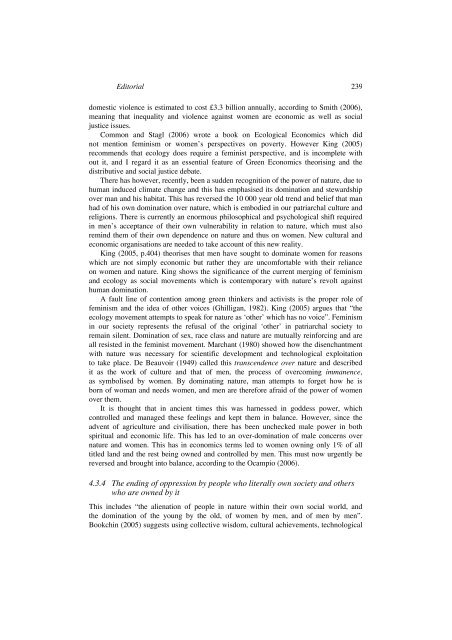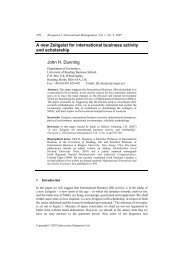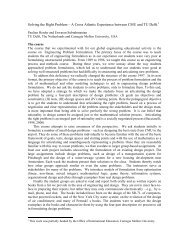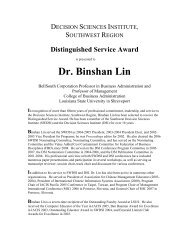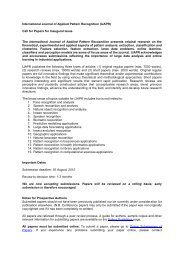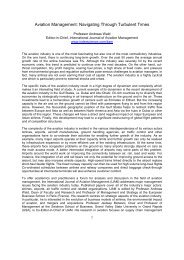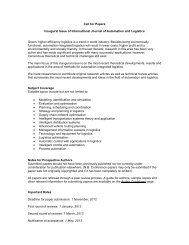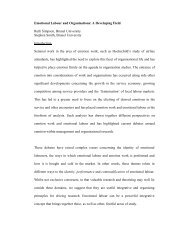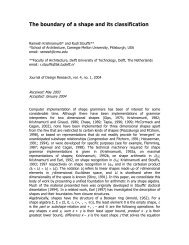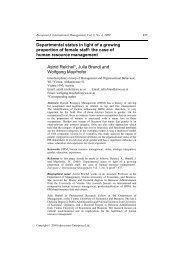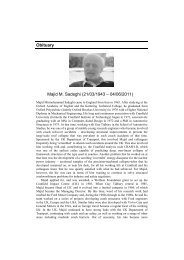Editorial: progress in Green Economics: ontology, concepts and ...
Editorial: progress in Green Economics: ontology, concepts and ...
Editorial: progress in Green Economics: ontology, concepts and ...
Create successful ePaper yourself
Turn your PDF publications into a flip-book with our unique Google optimized e-Paper software.
<strong>Editorial</strong> 239<br />
domestic violence is estimated to cost £3.3 billion annually, accord<strong>in</strong>g to Smith (2006),<br />
mean<strong>in</strong>g that <strong>in</strong>equality <strong>and</strong> violence aga<strong>in</strong>st women are economic as well as social<br />
justice issues.<br />
Common <strong>and</strong> Stagl (2006) wrote a book on Ecological <strong>Economics</strong> which did<br />
not mention fem<strong>in</strong>ism or women’s perspectives on poverty. However K<strong>in</strong>g (2005)<br />
recommends that ecology does require a fem<strong>in</strong>ist perspective, <strong>and</strong> is <strong>in</strong>complete with<br />
out it, <strong>and</strong> I regard it as an essential feature of <strong>Green</strong> <strong>Economics</strong> theoris<strong>in</strong>g <strong>and</strong> the<br />
distributive <strong>and</strong> social justice debate.<br />
There has however, recently, been a sudden recognition of the power of nature, due to<br />
human <strong>in</strong>duced climate change <strong>and</strong> this has emphasised its dom<strong>in</strong>ation <strong>and</strong> stewardship<br />
over man <strong>and</strong> his habitat. This has reversed the 10 000 year old trend <strong>and</strong> belief that man<br />
had of his own dom<strong>in</strong>ation over nature, which is embodied <strong>in</strong> our patriarchal culture <strong>and</strong><br />
religions. There is currently an enormous philosophical <strong>and</strong> psychological shift required<br />
<strong>in</strong> men’s acceptance of their own vulnerability <strong>in</strong> relation to nature, which must also<br />
rem<strong>in</strong>d them of their own dependence on nature <strong>and</strong> thus on women. New cultural <strong>and</strong><br />
economic organisations are needed to take account of this new reality.<br />
K<strong>in</strong>g (2005, p.404) theorises that men have sought to dom<strong>in</strong>ate women for reasons<br />
which are not simply economic but rather they are uncomfortable with their reliance<br />
on women <strong>and</strong> nature. K<strong>in</strong>g shows the significance of the current merg<strong>in</strong>g of fem<strong>in</strong>ism<br />
<strong>and</strong> ecology as social movements which is contemporary with nature’s revolt aga<strong>in</strong>st<br />
human dom<strong>in</strong>ation.<br />
A fault l<strong>in</strong>e of contention among green th<strong>in</strong>kers <strong>and</strong> activists is the proper role of<br />
fem<strong>in</strong>ism <strong>and</strong> the idea of other voices (Ghilligan, 1982). K<strong>in</strong>g (2005) argues that “the<br />
ecology movement attempts to speak for nature as ‘other’ which has no voice”. Fem<strong>in</strong>ism<br />
<strong>in</strong> our society represents the refusal of the orig<strong>in</strong>al ‘other’ <strong>in</strong> patriarchal society to<br />
rema<strong>in</strong> silent. Dom<strong>in</strong>ation of sex, race class <strong>and</strong> nature are mutually re<strong>in</strong>forc<strong>in</strong>g <strong>and</strong> are<br />
all resisted <strong>in</strong> the fem<strong>in</strong>ist movement. Marchant (1980) showed how the disenchantment<br />
with nature was necessary for scientific development <strong>and</strong> technological exploitation<br />
to take place. De Beauvoir (1949) called this transcendence over nature <strong>and</strong> described<br />
it as the work of culture <strong>and</strong> that of men, the process of overcom<strong>in</strong>g immanence,<br />
as symbolised by women. By dom<strong>in</strong>at<strong>in</strong>g nature, man attempts to forget how he is<br />
born of woman <strong>and</strong> needs women, <strong>and</strong> men are therefore afraid of the power of women<br />
over them.<br />
It is thought that <strong>in</strong> ancient times this was harnessed <strong>in</strong> goddess power, which<br />
controlled <strong>and</strong> managed these feel<strong>in</strong>gs <strong>and</strong> kept them <strong>in</strong> balance. However, s<strong>in</strong>ce the<br />
advent of agriculture <strong>and</strong> civilisation, there has been unchecked male power <strong>in</strong> both<br />
spiritual <strong>and</strong> economic life. This has led to an over-dom<strong>in</strong>ation of male concerns over<br />
nature <strong>and</strong> women. This has <strong>in</strong> economics terms led to women own<strong>in</strong>g only 1% of all<br />
titled l<strong>and</strong> <strong>and</strong> the rest be<strong>in</strong>g owned <strong>and</strong> controlled by men. This must now urgently be<br />
reversed <strong>and</strong> brought <strong>in</strong>to balance, accord<strong>in</strong>g to the Ocampio (2006).<br />
4.3.4 The end<strong>in</strong>g of oppression by people who literally own society <strong>and</strong> others<br />
who are owned by it<br />
This <strong>in</strong>cludes “the alienation of people <strong>in</strong> nature with<strong>in</strong> their own social world, <strong>and</strong><br />
the dom<strong>in</strong>ation of the young by the old, of women by men, <strong>and</strong> of men by men”.<br />
Bookch<strong>in</strong> (2005) suggests us<strong>in</strong>g collective wisdom, cultural achievements, technological


